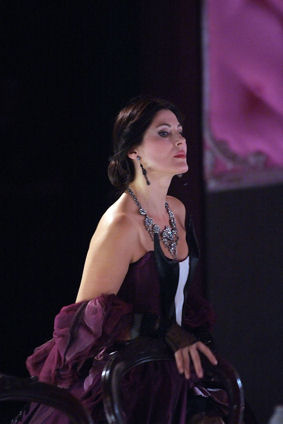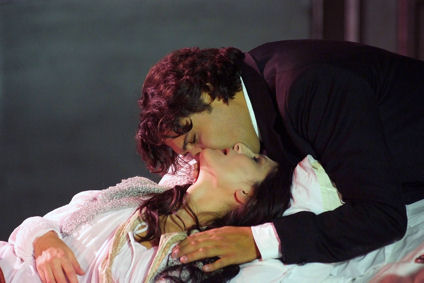Other Links
Editorial Board
- Editor - Bill Kenny
- London Editor-Melanie Eskenazi
- Founder - Len Mullenger
Google Site Search
SEEN AND HEARD
INTERNATIONAL OPERA REVIEW
Verdi, La Traviata: Soloists, Orchestra and Chorus Teatro Regio di Parma ,Conductor: Donato Renzetti 23.10.2007 (JMI)
Production from Deutsche Opera am Rhein and Théâtre de la Monnaie.
Director:
Karl-Ernst and Ursel Hermann
This
Traviata concluded the highly successful Parma’s Verdi Festival.
The production was directed by Karl-Ernst and Ursel Hermann, while
all of the physical elements were of Karl-Ernst's responsibility
only. Aesthetically, this was a very classical staging with the
exception of the second act. For the rest there was always a
semicircular stage, showing rooms from the end of the 19th century
with abundance of red velvet - something seen in this opera many
times before. Violetta's house offers a big table in the middle of
the stage, where the guests sat at ease; at Flora’s reception
there was a small stage at the back, where the choirs of Zingarelle
and Matadors sang or were ridiculed - I not sure which to choose of
the two). In the last act we came back to the beginning, changing
the table for a bed.
These
Sets, Costumes and Lighting:Karl-Ernst Hermann
Cast
Violetta Valery: Irina Lungu
Alfredo Germont: Massimo Giordano
Giorgio Germont: Vladimir Stoyanov
Flora Bervoix: Daniela Pini
Gastone: Gianluca Floris
Doctor Grenvil: Roberto Tagliavini

The most attractive sets were in act II with a small room at the
front of the stage and a big window behind it, showing a garden with
leafless trees under the snow. There were attractive costumes in
the first act, particularly Violetta's gown but there was less
interest offered by the costumes at Flora’s party, where the guests
were disguised in unattractive fancy dresses. The lighting was
generally good.
Much hard work
had been put into the direction, although some scenes worked better
than other. Violetta’s party was full of life and detail , and the
characters moved well in Act II, but perhaps with somewhat too much
physical aggression between them. Act III also worked well with some
personal touches in the final scene, where Doctor Grenvil entered in
Carnival disguise (doctors have right to enjoy, don’t they?) and
with great contrast between the outer celebration and the tragedy
inside the house, shown by a simple opening of the window, filling
the room with confetti and balloons. In summary, this was a
traditional production, very demanding in stage movement for the
principals, but with a final result that was not altogther
convincing.

This
particular performance was the only one featuring soprano
Irina Lungu as Violetta, while the rest of the series had Svetla
Vassilieva in the role. Lungu's Violetta was very much praised last
June when making her debut at La Scala and she has very positive
qualities indeed, which will doubtless lead her on to a good career.
She's a young woman (27 years old), slim, very attractive and an
outstanding actress. She also has an interesting voice, although
perhaps a little light for the opera last act. Irina Lungu is one of
those artists who seem to have everything that opera theatres demand
nowadays, following Peter Gelb's model at the New York
Metropolitan. She was very good in Acts I and II, with no problems
in the top notes of 'Sempre Libera', and was very convincing in her
duets with the Germonts. In the third act, her 'Addio del pasato'
was not quite moving enough, but she was again really convincing in
her death scene. A very interesting soprano, of whom we will surely
hear much in the future but the question will also be how long
will she last? It will depend on her decisions, it seems to me and Violetta
would seem to be her limit at the moment. I'd have doubts about her
forthcoming presence in Modena as Luisa Miller.
Mássimo
Giordano was a surprising Alfredo, surprising because the vocal
change of his tenor has been spectacular within a very few years. I
remember him as a light tenor and today the centre of his voice has
widened and is sadly not very good. Until his second act aria of the
second act he was fine, but from then on he began to have
difficulties, evident in the cabaletta, and showed definite pitch
problems later. This was a not too lucky development, although I am
sure he will continue to have the favour of theatres, since he is an
attractive figure on stage.
Bulgarian
baritone Vladimir Stoyanov was a very reliable Germont. He's a good
singer, very expressive, but with his usual problem of projection in
his upper register. Even so, he remains a
a
guarantee in of quality this repertoire and sang 'Di Provenza' with
great taste.
Among the
secondary roles, it is worth mentioning Roberto Tagliavini as Doctor
Grenvil, whose voice means that ss we will hear more of him soon..
Daniela Pini was a good Flora, Antonella Trevisan was a note-perfect
Annina, though Gianluca Floris was vocally lacking as Gastone.
Armando Gabba and Filippo Polinelli, appeared as Douphol and
D’Obigny.
The theater
was again sold out with many cheers for Lungu and Maestro Renzetti,
while Giordano had loud bravos from the women in the audience,
especially from the upper levels.
José M. Irurzun
Pictures ©
Teatro Reggio di Parma/Roberto Ricci
